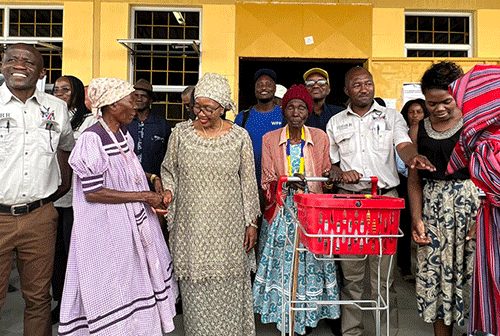UUKWANGULA – Prime Minister Saara Kuugongelwa-Amadhila said based on a vulnerability assessment and analysis, 695 000 people are in need of relief assistance in the country.
She made these remarks during the launch of the Commodity and Beneficiary Management Information System (CBMIS) project, which provides for the electronic storage of beneficiaries’ information and allowing for the issuance of vouchers to identified drought relief beneficiaries.
The CBMIS was launched during the commemoration of the International Day for Disaster Risk Reduction on Friday at the Uukwangula village in the Oshana region.
Kuugongelwa-Amadhila said the drought relief programme’s purpose is to save lives and sustain livelihoods.
The vouchers will be used to redeem approved food items under the drought relief programme at participating retailers.
“The system comes with a multitude of benefits, including stimulating local economic activities, because the food will no longer be sourced from Windhoek and transported to different regions. It will be sourced from local retailers, so their business activities will be supported,” she added.
The prime minister thus called on all citizens to cooperate with the drought relief programme’s implementing officers to ensure that the objectives of the programme are achieved.
Although the effects of drought are felt in all communities, Kuugongelwa-Amadhila said targeted food assistance will be given to the neediest who lack adequate coping measures.
“The drought relief programme will provide food and water to households, and assist livestock farmers. Households will now also receive a 20kg maize meal bag per month instead of a 12.5kg bag,” she noted.
The PM advised all farmers to seek relevant information from the respective offices of the ministry of agriculture – which will be implementing this support for farmers – on how they can participate in this programme.
Furthermore, the government has also considered revising the food basket provided to vulnerable households.
“We look at the size of the household. We are not saying the household which has 20 people should receive the same amount of food as the household which has two people,” Kuugongelwa-Amadhila stated.
Community members were likewise advised to desist from settling in flood-prone areas, which put their lives at risk of natural disasters.
Kombada Mhopjeni, the National Programme Officer of Science at UNESCO, said with a number of catastrophic events predicted globally at 40% between 2015 and 2023, assisting the affected communities in mitigating, adopting and anticipating hazards before they occur and managing them efficiently is more essential.
The Food and Agriculture Organisation (FAO) of the United Nations’ representative Qingyun Diao said in recognising the importance of disaster risk and reduction, FAO is working in collaboration with the government of Namibia and partners.
“Recently, FAO supported the ministry of agriculture with remote sensing-based crop yield estimations to improve data and evidence-generation by using advanced technologies,” said Mhopjeni.
– vkaapanda@nepc.com.na



